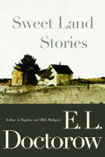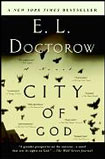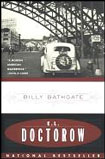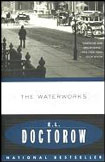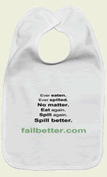|
||||||||
|
|
||||||||||
|
|
E.L. Doctorow
|
||||||||||
| * * |
In Sweet Land Stories, you move away from the familiar urban backdrops of your previous works to explore life in other parts of the United States. How are the characters in these stories shaped by the places they live?
The people in these stories are not are not shaped to a place in the way, for example the people in Sherwood Anderson's Winesburg, Ohio are defined by where they live. Most of the characters in Sweet Land Stories are looking for their place. They end up where they haven't been before. The five stories touch down from Washington D.C. to Alaska. That's why I named the book as I did.
A key theme in Sweet Land Stories is the persistent American belief in the ability of ordinary people to reinvent themselves (often corresponding with a move to a different place). Do you consider this belief to be chimerical, as suggested by your portrayals of such characters as Earle's mother in "A House on the Plains," Jolene in "Jolene: A Life," and Karen in "Baby Wilson"?
The pop psych word reinvent doesn't cover what is going on in these pieces. Mama and Earle, in "A House on the Plains," are righteous murderers looking to score. No thought of changing their ways. In "Jolene: A Life" it is the disasters Jolene lives through that leave her a changed woman. And so on.
You once said, "[My] books always come out of a very private mental excitement." Does this hold true for your short stories as well?
Yes, everything begins from an aroused mental state. It can come from a dream, an image in the mind, a fragment of conversation, a photograph, anything. And I write to understand why whatever it is excites me. Occasionally a novel is the result, occasionally a story, the difference being only that with a story the evocative excitement is more quickly understood and resolved.
For more than four decades, you have produced critically acclaimed books, stories, and essays at a remarkable pace. Have you followed the same writing routine over the course of your career, or have your writing habits changed over time? Have you ever experienced writer's block, and if so, how have you overcome it?
When I have had writer's block it is because I have been writing the wrong thing. When you're writing what is yours to write there is no block.
The stories in Sweet Land describe a world in which people's lives are routinely destroyed by cruel twists of fate, the evil machinations of others, or the inscrutable actions of unfeeling institutions. What makes life in your Sweet Land so bleak? Do you intend the stories, taken together, to be a comment on the human condition in general, or on American life in particular?
Watch out for phrases like "cruel twists of fate," "evil machinations," and "the human condition." They cannot be part of a serious literary discussion. And they lead you to false assumptions. Because when a novel of mine takes place in the past it is necessarily about the present. And I don't intend my stories to comment on anything. The comment you find in these stories is your comment. So is the bleakness yours. I think the emotional tone of the book is more complex than that. "Baby Wilson," for instance, is funny, at least as I read it.
© failbetter.com

